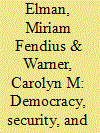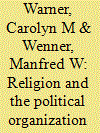|
|
|
Sort Order |
|
|
|
Items / Page
|
|
|
|
|
|
|
| Srl | Item |
| 1 |
ID:
081028


|
|
|
|
|
| Publication |
2008.
|
| Summary/Abstract |
This article analyzes the effects of democracy on religious political parties. Using a comparative and cross-regional approach, we argue that religious political parties in democracies can be "tamed" with access to patronage, power, and policy. While democracy tends to have a moderating influence, we identify the conditions and circumstances under which extremism may not be quelled merely by the party's participation in the government. The article briefly considers the arguments - both pro and con - that have emerged in recent debates over the intersection of religion, security, and democracy. The article then provides a framework for assessing the impact of democracy on religious political parties, and considers how these dynamics play out in the Asian region. In addressing the question "does democracy tame the radicals?" it is important to study Asia because it offers a set of varied democratic institutions; demonstrates different ways of adjudicating religion, the state, and secularism; and includes a diverse set of religious political parties espousing both moderate and radical political platforms. The article concludes with an overview of the Forum essays, which analyze democracy, security, and religious political parties in India, Indonesia, Italy and Israel.
|
|
|
|
|
|
|
|
|
|
|
|
|
|
|
|
| 2 |
ID:
075280


|
|
|
|
|
| Publication |
2006.
|
| Summary/Abstract |
Some analysts have raised serious concerns about the foreign and domestic policy implications of the large numbers of Muslims living in Western Europe. The fear is that Muslims as a bloc will co-opt the domestic and foreign policy of various European states, subsuming it to those of Muslims from a variety of Islamic states in the Middle East and Asia, and transform the secular nature of most European states. The historic and ingrained fear of Islam present in the populations of Europe (and, for that matter, the United States) has produced an inability to see the political nature of Islamic groups, especially outside the Islamic world. For example, both Europeans and Americans were quick to question the political motives and actions of Muslims in Europe and the U.S. when there was no organized and orchestrated condemnation of the attacks of September 11, 2001. What such critics fail to take into account is precisely one of the themes analyzed in the paper: the myriad divisions found among the Muslims of Europe. Western fears and criticisms are partly based on serious ignorance of the characteristics of Islam and of the people in Europe who adhere to it. Because Islam is a highly decentralized religion, it is structurally biased against facilitating large-scale collective action by its adherents. The one version which is hierarchically organized, the Shi'a, is barely present in Europe. In addition, Muslim immigrants are divided by their ethnic differences. Islam, being decentralized, allows for a myriad of practices in the different countries from which the immigrants came. Divided by ethnicity and by their own religious beliefs, Muslims in Europe will not constitute a group which will be able to impose its goals on European foreign and domestic policy. Muslims will, instead, be a diverse population with which European states find it difficult to negotiate, because of Islam's decentralized structure. a Footnotes a Carolyn M. Warner is Associate Professor of Political Science and Global Studies, Arizona State University (carolyn.warner@asu.edu). Manfred W. Wenner is Visiting Scholar, Department of Political Science, Arizona State University (mwwenner@northlink.com). The authors wish to thank Guity Nashat Becker, Jocelyne Cesari, Colin Elman, Miriam Fendius Elman, Roger Finke, Paul Froese, Anthony Gill, Phillip Hardy, Michael Hechter, Jennifer Hochschild, Kevin Jacques, Ramazan Kilinc, Timur Kuran, Peter McDonough, Michael Mitchell, Christopher Soper, Hendrik Spruyt, Robert Youngblood, three anonymous reviewers, the participants at the University of Washington Center for European Studies/European Union Center "September 11, Immigration and Nationalism in Europe" seminar, and the participants at the University of Wisconsin Madison "East and West: the Experience of Islam in an Expanding Europe" conference for their critical comments and suggestions. Errors and shortcomings remain our responsibility. The authors thank Beatrice Buchegger, Anita Clason, Katie Jordan, Megan McGinnity, and Seth Turken for research assistance, and the Arizona State University Center for the Study of Religion and Conflict for financial support.
|
|
|
|
|
|
|
|
|
|
|
|
|
|
|
|
| 3 |
ID:
081031


|
|
|
|
|
| Publication |
2008.
|
| Summary/Abstract |
The Christian democratic parties in Italy from the end of World War II to 2006 show that while the popularity of religious political parties may diminish due to fewer religious voters, if political institutions facilitate the participation of small parties in government then religious parties can survive, albeit in reduced size. Their political influence may be greater than suggested by their size if they can be a deciding element in a governing coalition's survival. With access to the spoils of office, religious parties are able to distance themselves from the demands of seemingly powerful organized religious interests. Having to compromise with other parties in the government on policy in order to remain in government can also compel a religious party to moderate its platform and even soft-pedal core religious issues. The Christian democratic parties of Italy have, due to ideology and to strategic assessments of security interests, supported Western regional and international security cooperation
|
|
|
|
|
|
|
|
|
|
|
|
|
|
|
|
| 4 |
ID:
103536


|
|
|
|
|
| Publication |
2011.
|
| Summary/Abstract |
The article outlines a framework for the analysis of religion and foreign policy. Despite the increased attention to religion in international relations, questions remain. Particularly controversial, yet relatively unexplored, is the role of religion in the foreign policies of states. We extrapolate from theories in the fields of international relations and comparative politics to explore religion's potential avenues of influence on foreign policy. There are potential tools of analysis in these fields, which can be fruitfully extended and applied to understand the role of religion in foreign policy. We propose a framework within which various causal pathways and mechanisms can be situated. We also show how contributions from the field of religion and politics might be used to frame theories and specify further hypotheses about religion and foreign policy. After identifying the main threads of these lines of research, we discuss how to apply them to the question of the role of religion in foreign policy and set out a new research agenda. We conclude that the potential of these theoretical approaches to the analysis of religion has not yet been exploited.
|
|
|
|
|
|
|
|
|
|
|
|
|
|
|
|
|
|
|
|
|